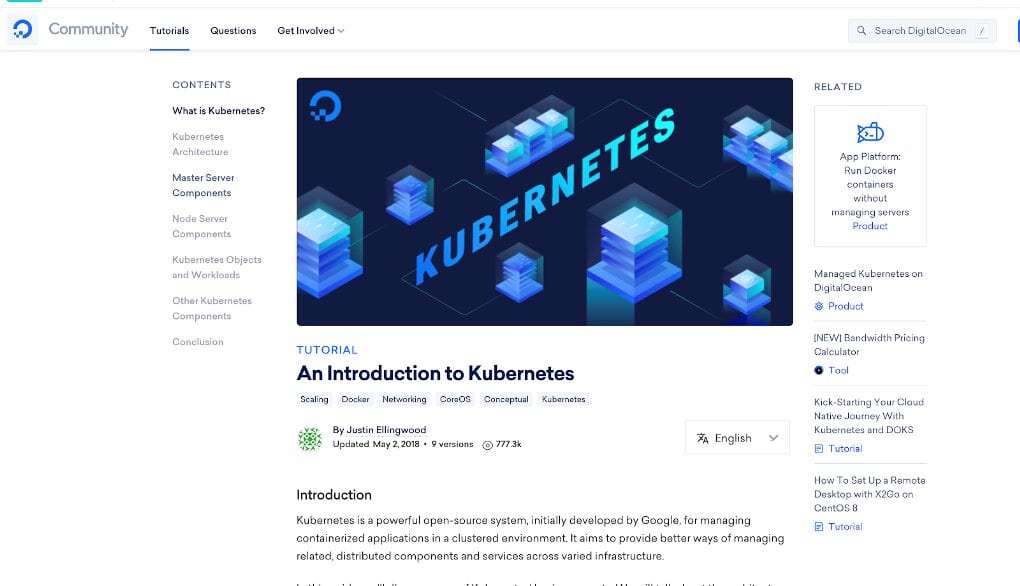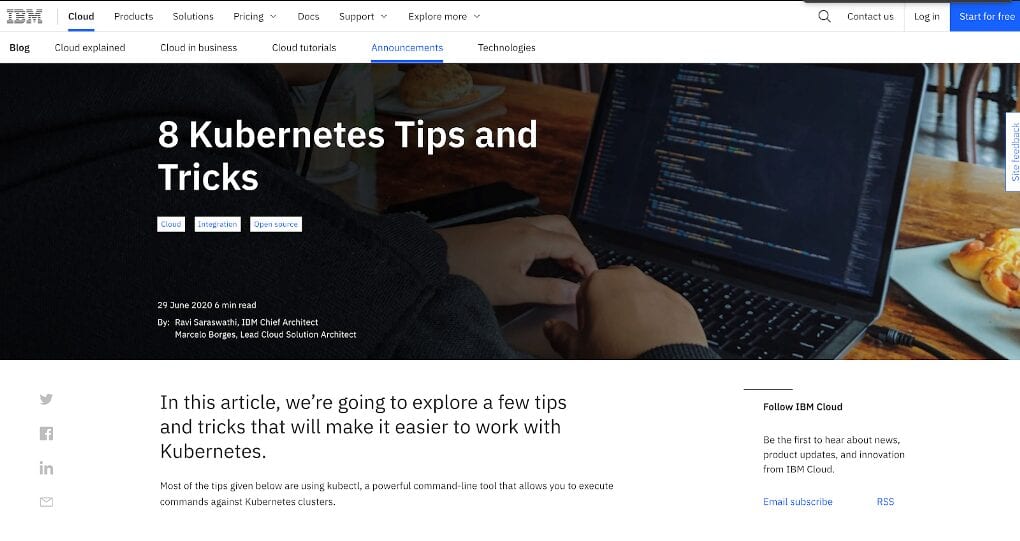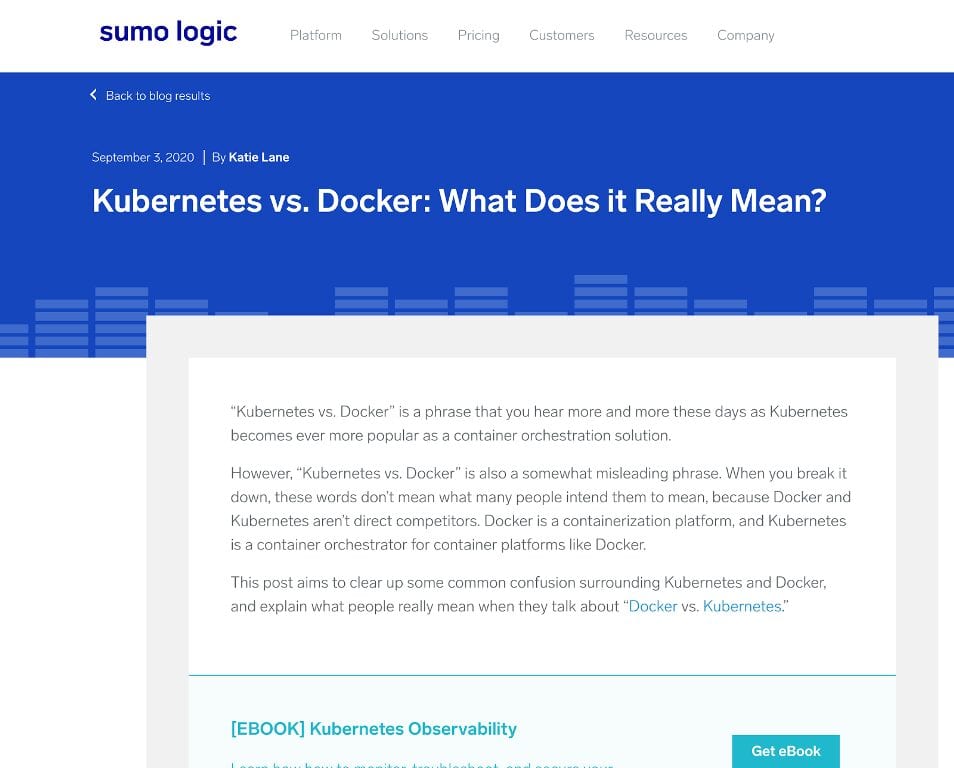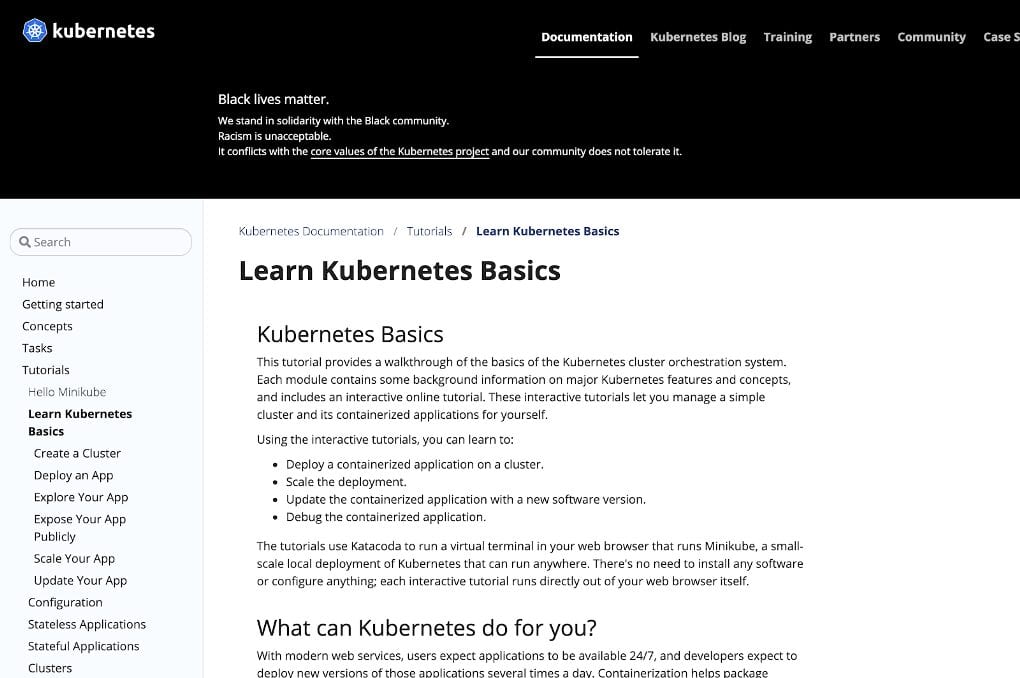What is Kubernetes?
Kubernetes is an open-source platform for managing containers and services. Kubernetes, often abbreviated k8s (due to the number of letters in between ‘k’ and ‘s’), eliminates the need for manual Linux container operations when deploying or scaling applications.
What is Kubernetes Used for?
The basic idea behind Kubernetes is to move away from physical machines that run applications and onto containers in the cloud.
Kubernetes is a container management system for clusters of containers on virtual machines. It assists companies by helping them to scale their applications efficiently.
Kubernetes is used in major companies with many developers working on large-scale applications. Using the platform for small, personal applications, like hosting a resume or a blog, is overkill but it can still be used. You just won’t need as many containers.
Learning Kubernetes
Learning how Kubernetes works may seem foreign if you’re coming from a web development world but there’s value in knowing the platform. Go in with the mindset that you are learning to work with a cloud infrastructure and its administration and you’ll pass any hurdle.
Let’s take a look at what you can expect when learning Kubernetes.
How Long Does It Take to Learn Kubernetes?
Kubernetes basics can be learned in a couple of hours.
However, going in depth and learning enough to earn a certification will take more than 40 hours, which should include studying for the exam.
If you need to use it professionally because your team is switching to it, expect to spend anywhere from a few hours to a few days to get used to the new environment.
How to Learn Kubernetes: Step-by-Step
There are two steps you must take before you start learning Kubernetes.
The first thing to do when learning Kubernetes is to be familiar with a container system first. There are plenty available, but the most popular is Docker.
It is helpful to learn about the ins and outs of Docker or another system first so you can learn about container quirks. Kubernetes is built on top of Docker to facilitate container management. So being familiar with Docker will help you in learning Kubernetes.
The next thing to do before getting started with coursework or self-study is to learn basic Linux system administration.
Once these two prerequisites are fulfilled, you are ready to start learning Kubernetes!
The Best Kubernetes Courses and Trainings
Online courses and training guide your path to becoming a Kubernetes expert! When choosing courses, always pay attention to when the courses were released so you know if you will be receiving the latest information.
If there are no courses that offer the latest information, make sure to have the documentation open so you can still follow during lessons and make code changes as you go.
Online Kubernetes Courses
Here are some of the best courses available online that teach Kubernetes or prepare you for Kubernetes certification exams.
Learn k8s Academy
- Learn k8s
- Self-paced
- Prerequisites: None
- Prices: $89-$499
The Learn k8s offers a set of nine courses to prepare you for the Kubernetes Application Developer certification. You can buy the courses individually or bundle them together with lifetime course updates.
Kubernetes for the Absolute Beginners – Hands-on
- Udemy
- Self-paced
- Prerequisites: Basic System Administration
- Price: $15.99-129.99 (get it while on sale!)
In this course by KodeKloud Training, Mumshad Mannambeth introduces you to the world of DevOps Engineering by teaching Kubernetes. This course is intended for complete beginners to Kubernetes.
Free Kubernetes Courses
Introduction to Kubernetes
- Linux Foundation
- Self-paced
- Prerequisites: Some knowledge of Linux system administration is helpful but not required.
- Price: FREE
This free course from The Linux Foundation will teach you about the origin, architecture, primary components, and building blocks of Kubernetes.
The learning objectives passed here will help you in more advanced Kubernetes courses.
| NOTE: The Linux Foundation was originally founded to standardize Linux, but has expanded to add events, certifications, Kubernetes, and other cloud projects to its queue of offerings. |
Kubernetes Books
When looking for books on Kubernetes, try to find ones that are no more than a year old. The technology changes so fast, that having anything over a year old may not serve you well. That being said, there are a few books that can assist in your Kubernetes and DevOps journey:
‘The Kubernetes Book’
By Nigel Poulton
Written by Nigel Poulton, every example in the book has been checked against the latest version of Kubernetes (1.18). It includes a chapter on the newest Kubernetes changes.
This book is split into two main sections: Kubernetes background and Kubernetes as an operating system in the cloud.
It was last updated in September and has a commitment from the author to at least be looked at every year to be updated if needed.
‘Kubernetes: Up and Running:
Dive into the Future of Infrastructure (2nd edition)’

"Career Karma entered my life when I needed it most and quickly helped me match with a bootcamp. Two months after graduating, I found my dream job that aligned with my values and goals in life!"
Venus, Software Engineer at Rockbot
by Brendan Burns, Joe Beda, Kelsey Hightower
This guide on Kubernetes was co-authored by one of the the founders of the Kubernetes Open Resource Project. He and two other authors have written a helpful compendium into how to get started with Kubernetes.
Kubernetes Certifications
The Linux Foundation has a number of certifications available to show you have demonstrable skill in working with Kubernetes. Taking these courses is not required to take each of the exams.
Certified Kubernetes Administrator (CKA)
This certification is for Kubernetes administrators, cloud administrators and other IT professionals who manage Kubernetes instances. The Kubernetes Fundamentals course listed here will prepare you for the CKA exam.
Kubernetes Fundamentals (LFS258)
- The Linux Foundation
- Self-paced – 35 h of course material
- Pre-requisites: Linux concepts and command line, Package managers, Git and GitHub, Introduction to Kubernetes (recommended)
- Course: $299; Exam: $300; Course + Exam: $499
This course will prepare you for the Certified Kubernetes Administrator(CKA) Exam.
Certified Kubernetes Application Developer (CKAD)
This certification is for Kubernetes engineers, cloud engineers and other IT professionals responsible for building, deploying, and configuring cloud native applications with Kubernetes. The Kubernetes Fundamentals course listed here will prepare you for the exam, but is not required to take the exam.
Kubernetes for Developers (LFD259)
- The Linux Foundation
- Self-paced – 35 h of course material
- Pre-requisites: Linux concepts and command line, Package managers, Git and GitHub, Introduction to Kubernetes(recommended)
- Course: $299; Exam: $300; Course + Exam: $499
The topics covered in this course will form your foundational knowledge to obtain a Cloud Native Foundation’s Certified Kubernetes Application Developer (CKAD) Certification.
Certified Kubernetes Security Specialist (CKS)
This certification is ideal for anyone holding a CKA certification and interested in cloud security. The Kubernetes Security Essentials course listed here will prepare you for the exam, but is not required to take the exam.
Kubernetes Security Essentials (LFS260)
- The Linux Foundation
- Self-paced – 35 h of course material
- Pre-requisites: CKA-certified (highly recommended)
- Course: $299; Exam: $300; Course + Exam: $499
This course by The Linux Foundation is for anyone who would like to work with security in the cloud environment. It will prepare you for the Kubernetes Security Specialist (CKS) Exam.
Online Kubernetes Resources
You need resources to help you throughout your Kubernetes journey. Refer to the following websites when you feel stuck. These are decent resources you can rely on.
An Introduction to Kubernetes

In this overview by DigitalOcean, you’ll learn about what Kubernetes is, its architecture, and what that architecture is made up of.
8 Kubernetes Tips and Tricks

IBM has curated a list of tips and tricks to work with Kubernetes. This compilation includes Kubernetes tutorials, a video on how container orchestration works, and how to get started with IBM’s Cloud Kubernetes Service.
Kubernetes vs. Docker: What Does It Really Mean?

A helpful blog post that will help you figure out the distinction between Kubernetes and Docker (Hint: It’s like thinking of Docker as an orchestra section — violins, violas, woodwinds, etc. — and Kubernetes as an orchestra conductor).
Learn Kubernetes Basics

This basic tutorial by Kubernetes will provide you with a walkthrough to get started to learn Kubernetes cluster orchestration system. It has an interactive tutorial that will help you learn what Kubernetes can do for you in terms of managing your clusters of containers.
Why Should You Study Kubernetes?
Studying Kubernetes will benefit you if you plan to become a DevOps Engineer or want to work for a company that uses the cloud as a part of its solution stack. Some of the companies that use Kubernetes include:
- Shopify
- Robinhood
- Slack
- The New York Times
Some of the most popular companies in the country use Kubernetes. Because of its popularity, it’s not going away any time soon.
Good luck!
About us: Career Karma is a platform designed to help job seekers find, research, and connect with job training programs to advance their careers. Learn about the CK publication.



